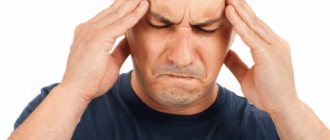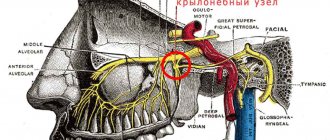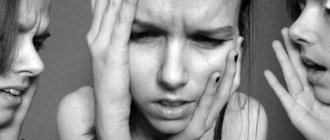General weakness, lack of coordination, a feeling of falling, darkening of the eyes after getting out of bed in the morning can occur due to lack of sleep or nervous tension. Often after sleep, when turning, you feel dizzy due to lack of blood sugar and taking medications. Systematic morning dizziness (vertigo) is a signal that you need to see a specialist. A disruption in the interaction of the vestibular apparatus, visual organs and brain may indicate the development of a pathological process in various systems of the body.
Benign positional paroxysmal vertigo begins suddenly when suddenly assuming an upright position after sleep. BPPV is more common in women, and the frequency of attacks increases with age. Such dizziness does not cause consequences and is easily cured. The development of BPPV provokes the deposition of calcium salts (statoliths) in the inner ear. They create a spinning sensation when they break off the membrane when getting out of bed or when tilting the head. BPPV is caused by:
- taking strong antibiotics and antihistamines;
- consequences of traumatic brain injuries;
- drinking a large dose of alcohol before bedtime;
- inflammatory processes in the inner ear;
- age-related changes (disorders of the vestibular apparatus, deformation of the cervical vertebrae).
Sleeping in an uncomfortable position can trigger dizziness in the morning. An incorrectly chosen pillow does not allow the muscle corset to relax and does not support the cervical spine. As a result: during sleep, the blood vessels supplying the brain are compressed, and in the morning you feel dizzy.
Benign positional paroxysmal vertigo may be accompanied by nausea, paleness of the face, weakness, and sweating. The attack begins for no apparent reason and quickly ends after 30-60 seconds.
Note! The main signs by which you can independently distinguish BPPV from disorders of the functioning of the brain and central nervous system are the absence of tinnitus and deafness.
Diagnosis and treatment of BPPV
To determine whether vertigo is a result of head movement, a specialist will perform a Dix-Hallpike test. BPPV must be differentiated from cancer and multiple sclerosis; for this, MRI and x-ray methods are prescribed. Non-drug treatment consists of performing special exercises to train the vestibular system.
Medications are prescribed to treat the underlying disease; vestibulolytics are used to eliminate symptoms. Surgical treatment is indicated when previous methods are ineffective. Labyrinthectomy and microsurgical interventions on the inner ear are used.
Pathological dizziness after sleep
Vertigo is often the first symptom and warns of serious illness. You may feel dizzy in the morning if the nerve endings are damaged (neuropathy). The attacks are accompanied by nausea, vomiting, and fainting due to decreased blood pressure. With hypoglycemia (decreased blood glucose concentration), weakness, cold sweat, and darkening of the eyes are observed.
With neurotic disorders, after waking up, patients hear ringing in the ears and noise in the head. Pathologies of the cervical spine lead to compression of the arteries. Insufficient blood supply provokes dizziness after waking up, which is aggravated by discomfort in the temples, ripples in the eyes, nausea and vomiting.
Patients with multiple sclerosis experience a feeling of instability and loss of balance. With cancerous damage to the brain, headache pain intensifies in the morning, which is accompanied by a feeling of instability and loss of balance, blurred vision, and vomiting.
Dizziness in the morning occurs when:
- inflammatory process in the ear canal and tissues of the inner ear;
- atherosclerosis;
- arterial hypotension;
- arterial hypertension (if blood pressure increases, dizziness may occur during sleep);
- Meniere's syndrome (disorder of the structures of the inner ear);
- migraines caused by spasm of intracranial vessels.
Do not get out of bed suddenly, drink a glass of water while sitting, get up without sudden movements. Eat more strawberries, chokeberries, and black currants. Berries stimulate metabolism in nerve cells and improve general condition. For benign dizziness, a drink with honey and apple cider vinegar helps.
Be sure to harden yourself, take a contrast shower, spend more time in the fresh air, and do not drink alcohol or coffee before going to bed. Before going to bed, ventilate the room so that the brain receives more oxygen.
Do not try to determine the causes of morning dizziness yourself. If attacks appear systematically, contact specialists for a serious examination.
List of used literature:
- Zepelin H. Normal age related changes in sleep // Sleep Disorders: Basic and Clinical Research / ed. by M. Chase, E. D. Weitzman. — New York: SP Medical, 1983.
- Foldvary-Schaefer N., Grigg-Damberger M. Sleep and epilepsy: what we know, don't know, and need to know. // J Clin Neurophysiol. — 2006
- Poluektov M.G. (ed.) Somnology and sleep medicine. National leadership in memory of A.N. Vein and Ya.I. Levina M.: “Medforum”, 2016.
Dizziness at night when turning the head or in other conditions is a symptom of many diseases that can develop in a child or an adult. These diseases, as a rule, are chronic and constantly progress, leading to increased attacks of dizziness at night and reducing a person’s quality of life. In such situations, the patient should always seek qualified help from a doctor who will conduct all the necessary clinical studies and also select effective treatment.
Some people complain of dizziness while resting at night
Dizziness when turning head
Dizziness is a common reason (2nd most common after complaints of pain in the head area) for seeking professional medical help.
If you feel dizzy when turning your head when the patient is in a lying position, this can be associated with many pathologies.
To confirm the diagnosis of BPPV, known as benign paroxysmal vertigo, or another, the doctor will order an examination, the results of which will help determine the causes of the disorders.
Characteristics and classification
Dizziness that appears when moving the head is a symptom of many diseases, including neurological and ophthalmological, as well as disorders of the endocrine and cardiovascular systems.
This is a condition that is accompanied by subjective sensations. They are described as spinning, spinning, turning the body over, a feeling of falling, plunging into an abyss, or moving in space.
The patient may experience a feeling of mobility of the patient's body or things that surround him.
Severe dizziness that appears when turning the head when the patient is in a lying position often indicates damage to part or all of the vestibular apparatus (perceives the current position of the body in space and reacts to any change in posture). The vestibular apparatus is located in the area of the inner ear and is a receptor that transmits and receives impulses from the vestibular analyzer.
There are systemic and non-systemic forms. In the first case, damage to the vestibular apparatus is assumed. In this case, the sensations that arise are described by patients as rotational, oscillatory, or identical to being in a moving elevator. A common systemic form is BPPV, whose share in the general structure of vestibular disorders is about 35%.
Dizziness with BPPV occurs when you turn your head to the sides. The pathology manifests itself in short-term (up to 60 seconds) attacks, during which one feels dizzy; the condition usually develops from sudden movements. Often attacks occur only in a horizontal position when the patient turns on his side. The pathology is usually accompanied by symptoms - nystagmus and nausea.
Non-systemic forms develop against the background of various diseases. An example is vertebrobasilar insufficiency, leading to deterioration of blood supply to the vestibular apparatus, osteochondrosis, spondylosis and other pathologies of the cervical spine, provoking compression of the arteries supplying the brain and deterioration of cerebral blood flow.
https://www.youtube.com/watch?v=LFzvEYSsgUA
Non-systemic forms are manifested by fainting, dizziness, provoked by psychophysiological factors. The main symptoms are combined with pathological changes in gait and instability when walking.
In the systemic form, the patient is haunted by sensations of turning over, spinning, rotating the body or objects around, while in the non-systemic form, a feeling of loss of balance, falling through, or falling often occurs.
Causes and pathogenesis
The doctor will tell you why you feel dizzy when you turn your head sharply to the right, based on the results of a diagnostic examination.
The causes of dizziness that occur at night while resting in a supine position when turning the head correlate with BPPV and TBI.
In cases where dizziness occurs due to BPPV, the causes of the pathology are associated with changes in the position of otoliths (hard formations that perceive mechanical irritations) in the semicircular tubules.
Normally, when the body posture changes or under the influence of acceleration, the otoliths shift, which leads to the transmission of nerve impulses to the parts of the brain responsible for maintaining balance.
The head feels dizzy when turning over due to the development of cupulolithiasis or canalolithiasis.
In cupulolithiasis, otolith fragments are found on the cupula (a jelly-like structure covering the hairs of the epithelial cells of the sensory crests) of the semicircular canal.
With canalolithiasis, otoliths move freely in the area of the semicircular canal.
The causes of non-systemic forms are often associated with osteochondrosis or VSD (vegetative-vascular dystonia), then dizziness is accompanied by symptoms of disruption of the autonomic system (tachycardia - accelerated heartbeat, rapid, shallow breathing, increased sweating, paresthesia - burning sensation, tingling, itching in the skin area) and headache.
One of the reasons why conditions develop when dizziness and swaying occurs is a violation of the blood supply to the elements of the vestibular apparatus. The vertebrobasilar network of the circulatory system of the brain feeds the sections - the labyrinth, the vestibular-cochlear nerve, the vestibular nuclei located in the brain stem, and the cerebellum.
Non-systemic dizziness can occur as a physiological reaction to physical and mental stress that is unusual for a person.
These include long trips in a car or sailing on a sea vessel, climbing to high altitudes.
With increased intracranial pressure, hydrocephalus, atherosclerosis of cerebral vessels, abscess and other infectious lesions of the brain, dizziness is often accompanied by noise and buzzing in the ears.
The pathogenesis of disorders lies in the imbalance between data coming from sensory organs (hearing, vision) and systems (vestibular, proprioceptive), as well as from cortical brain structures where information processing occurs. The coordinated work of the listed organs and systems ensures orientation in space. When disturbances occur in any of the departments, vestibular disorders develop.
Associated symptoms
Symptoms accompanying dizziness depend on the cause of the pathology. When dizziness occurs with non-systemic forms of pathology, the accompanying symptoms that occur if the patient turns his head include the following signs:
- Restlessness, feeling of anxiety.
- General weakness.
- Confusion of consciousness, feeling of imminent fainting.
- Unsteadiness of gait.
- Instability in a vertical position.
If you feel dizzy and dizzy, the doctor will prescribe a comprehensive examination to find out the causes of the disturbances. The true form of dizziness occurs due to damage to the elements of the vestibular apparatus. Characteristic signs: nystagmus, disruptions in the autonomic system, panic attacks. Common pathologies manifested by dizziness and accompanying symptoms:
- Meniere's syndrome. Decreased hearing acuity, horizontal or rotatory nystagmus (rotational movements of the eyeballs around the sagittal axis) type.
- Labyrinthitis of viral, bacterial etiology. The pathology is characterized by nausea, vomiting, nystagmus, imbalance, decreased hearing acuity, noise, and ringing in the ears. Bacterial labyrinthitis is often accompanied by an increase in body temperature.
- BPPV. Attacks occur if the patient turns his head or changes his body position, are characterized by a short duration, and go away on their own. More often diagnosed in women. The causes of occurrence are associated with head injury, infection of the middle ear, and surgical operations in the area of the hearing organs. In elderly patients, BPPV develops after a labyrinthine infarction. If you feel dizzy at night due to BPPV, there are usually no associated symptoms. Patients do not experience headache, decreased hearing acuity, buzzing or tinnitus.
- Vestibular neuronitis. The symptom of dizziness is combined with nausea, vomiting, panic attacks, feelings of anxiety and fear, nystagmus - frequent, oscillating movements of the eyes. The patient has difficulty walking due to instability. The main causes of occurrence: previous respiratory viral infection, metabolic disorders.
The post-traumatic form develops against the background of a traumatic brain injury, a fracture of the pyramid located in the area of the temporal bone, damage to the membranes of the labyrinth formed by thin bone structures. It manifests itself as nausea, accompanied by bouts of vomiting, nystagmus, and inability to maintain balance. Dizziness in the post-traumatic form occurs or intensifies with sudden movements.
In non-systemic forms, the head is dizzy due to rotation of the neck; the state of dizziness often precedes confusion or fainting. The main accompanying symptoms: anticipation of a fall, a feeling of panic, darkening of the eyes, rapid heart rate, general weakness, sweating. Non-systemic forms correlate with pathologies:
- Arterial hypotension.
- Vegetovascular dystonia.
- Atherosclerotic lesions of cerebral arteries and other vascular diseases.
- Heart failure, atrial fibrillation, mitral valve dysfunction and other heart diseases.
- Bronchial asthma and other diseases of the respiratory system.
In non-systemic forms, the head often feels dizzy after turning the eyes or neck when the patient is in an upright position. If dizziness is observed only when standing or walking and disappears when the patient lies or sits, it is not considered idiopathic (true, independent of other pathologies).
Clinical manifestations
Generally speaking, dizziness is a normal reaction of the body to a number of different stimuli of the vestibular apparatus. For example, they accompany rides on carousels, swings, etc. This situation is due to differences between the resulting visual image and data on body position. This imbalance occurs in many men and women.
But dizziness at night, when the body is motionless and in a horizontal position, no pathological sensations should arise. However, some people have a predominant complaint of dizziness at night, including when turning their head. In addition, patients complain of nausea and vomiting. If the patient turns over in bed, then all the symptoms become stronger.
Identifying the specific cause of symptoms is only possible in a medical institution when you consult a doctor.
In such situations, you should not hope that the symptoms will disappear in the morning and the illness will go away on its own. You should always seek medical help from a medical facility to identify the underlying cause of night dizziness.
What are the types of dizziness?
A healthy person may feel dizzy when exposed to strong stimuli. These signs appear if you go on rides, ice skates, when the force of rotation acts on the body. Dizziness is divided into types:
- Vestibular, in other words, vertigo. This option is called true, and a person feels the circulation of everything around him and his body.
- Collaptoid, when changes in body position or pressure contribute to severe dizziness. You immediately want to fall and end up in a horizontal position.
- When balance is disturbed, adults feel spinning in their heads, which they consider not true.
- A sensation often attributed to dizziness. With depression and other neurological diseases, patients cannot clearly describe their condition. They call the pain in the heart and the feeling of fear dizziness.
Occurrence of attacks
Doctors tend to consider several causes of dizziness during sleep.
When a person experiences dizziness at night, the reasons for this condition can be different. Why might night dizziness occur? Doctors identify the following conditions.
- Diseases affecting the inner ear, primarily various labyrinthitis. Such diseases are always accompanied by dizziness when turning the head, including at night, as well as other symptoms: tinnitus, decreased hearing acuity, etc. If left untreated, otitis media can lead to complete deafness.
- Atherosclerosis in the cerebral arteries disrupts the blood supply to the brain, including its vestibular part. The patient notes dizziness during and after sleep, as well as a decrease in memory, attention and other mental functions.
- Unstable blood pressure, accompanied by its increase or decrease, very often becomes the cause of the periodic appearance of this symptom.
- Osteochondrosis, accompanied by compression of blood vessels and nerve roots, can also cause severe attacks of dizziness at night.
Dizziness may be one of the symptoms of osteochondrosis
In addition, other conditions can cause the feeling of rotating objects - diseases of the cardiovascular system, endocrine disorders, pregnancy, etc. In each clinical situation, the underlying disease can be identified only after a neurological examination of the patient using laboratory and instrumental methods.
Chronic lack of sleep, frequent stress and fatigue lead to gradual depletion of the central nervous system. This condition is manifested by dizziness, depression and apathy. For these diseases, it is necessary to consult a psychiatrist to identify possible causes of mental disorders.
Diagnosis of the disease
The appearance of dizziness during sleep requires contacting a medical facility due to a large number of possible causes. When attempting to make an independent diagnosis and prescribe treatment, the progression of the underlying disease and the development of its complications are possible.
Interpretation of the results obtained should only be carried out by a medical specialist. Patients should not try to independently evaluate the data of the examination methods performed.
Diagnosis algorithm:
- Collecting patient complaints with careful questioning about the characteristics of his work, lifestyle, and previous illnesses.
- External examination of the patient, neurological examination and mandatory consultation with an otolaryngologist to exclude damage to the middle ear.
At a consultation with an ENT doctor
- Blood and urine tests to assess general health and identify inflammatory processes.
- Additional methods, including radiological studies (radiography, computed tomography, ultrasound procedures, etc.).
- Consultations with related specialists, including a psychiatrist.
An integrated approach to diagnosis makes it possible to identify the underlying disease that leads to dizziness and, based on this, select effective methods of therapy, including medicinal and non-medicinal.
Treatment approaches
Effective treatment of diseases is possible only after a full clinical examination of the patient and consultation with a doctor. In this case, treatment should primarily be aimed at eliminating the underlying disease:
- disturbances in blood pressure, most often its increase, require the prescription of medications from the group of angiotensin-converting enzyme inhibitors, for example, Enap, Enalapril, etc.;
Antihypertensive drug
- for osteochondrosis, nonsteroidal anti-inflammatory drugs (Ketorolac, Nimesulide), muscle relaxants, as well as physical therapy and massage are used;
- to eliminate the consequences of cerebral atherosclerosis, vascular-active medications (Actovegin, Cerebrolysin), nootropics (Piracetam, Nootropil) and antioxidants (Tocopherol, Dihydroquercetin) are used;
- the fight against dizziness and associated clinical manifestations requires the use of antihistamines (Pipolfen), sedatives, including herbal ones, and antiemetics (Metoclopromide).
Under no circumstances should you self-medicate. This is fraught with the development of side effects of therapy, as well as possible progression of the underlying pathology.
In addition, many patients use traditional medicine. However, such treatment approaches do not have proven effectiveness and safety, and therefore they should not be used as monotherapy, but should always be prescribed in combination with medications.
Dizziness during or after sleep is an unpleasant symptom that causes a decrease in quality of life and is accompanied by significant discomfort for the patient. There are many reasons for the development of such conditions, and only the attending physician, after conducting a clinical examination, can make an accurate diagnosis. In this regard, in no case should you delay contacting a medical institution. Early initiation of therapy allows you to achieve complete recovery and ensure the absence of relapses of various diseases.
Chronic lack of sleep, constant workload, stress and illness lead to the body's strength being depleted. Sluggish diseases appear that can lead to dizziness during sleep. These may be chronic diseases of the ENT organs, for example, sinusitis, or inflammatory processes in the gastrointestinal tract (inflammation of the small and large intestines). Rheumatic diseases and tuberculosis in any form can also lead to dizziness while resting at night. There is another disease that causes dizziness, it is transmitted through tick bites - Lyme disease.
A person weakened by illness notices the appearance of dizziness when he lies down to rest in the evening, and sometimes he is tormented by dreams in which he feels dizzy. Some try to find the answer in the dream book, but the answer should be sought from doctors. The cause of inadequate rest was most likely a disease that requires diagnosis and treatment.
Dizziness is considered normal if it occurs quite rarely and under the influence of certain factors: when riding on swings, carousels and other similar attractions, when suddenly rising from a horizontal to a vertical position. This occurs because an imbalance occurs between the visual analyzing center and the vestibular apparatus due to a change in position.
It turns out that, being in a horizontal position, a person should not feel dizzy. But some patients insist that it is during a night's rest that they experience unpleasant symptoms, when they feel dizzy, sometimes accompanied by nausea and vomiting. Symptoms worsen when turning in bed. Don't expect dizziness to go away on its own. It is necessary to look for the cause that caused dizziness. These reasons may be serious changes occurring inside the body or its individual organs.
Emergency help
It doesn’t matter whether this attack happened in the morning or evening. The dream book will not help here; you need more active actions to alleviate your condition:
- Provide a flow of fresh air into the room.
- Your clothes should be loose and not constrict your body.
- Gently massage your head and neck to improve blood circulation.
- Breathing should be deep but slow, mainly using the belly.
- Focus your gaze on an object that is not moving, this will help the vestibular system return to its normal position.
- Be sure to take blood pressure measurements and, if necessary, take medications that normalize it.
- Visit a doctor, if there is no improvement, then call an ambulance.
What your body lacks if vertigo occurs, only a doctor can find out. Any fortune telling on coffee grounds and self-medication can only aggravate the situation and lead to an even more serious condition and consequences.
The main reasons leading to dizziness
Experts tend to consider several reasons that cause dizziness while resting or being in a horizontal position. Usually this symptom is concomitant with the following diseases or conditions:
- Arterial hypertension or hypotension. Both of these diseases lead to instability of blood pressure, while a person may periodically experience unpleasant symptoms in the form of dizziness and vomiting.
- Atherosclerotic plaques block the lumen of vital vessels, and this leads to impaired blood circulation in the brain. Vascular atherosclerosis can be accompanied by unpleasant phenomena. A person notices that he feels dizzy even at rest, especially in the evening before going to bed, or in the morning, even before getting out of bed.
- Inner ear diseases are very dangerous. With otitis media (labyrinthitis), the mucous membrane of the inner ear becomes inflamed. Its cavity is filled with purulent contents, causing discomfort, tinnitus, and hearing impairment. Under pressure from the pus, the eardrum is displaced, causing the person to experience dizziness and pain in the head and ears. After the inflammation has been cured, symptoms of dizziness, ear congestion or hearing loss may still bother you for some time. The most common cause of peripheral vertigo is pathology of the inner ear.
- Violation of the vestibular function of the body is associated with Meniere's syndrome. With this disease, the tone of the vessels responsible for feeding the vestibular apparatus and auditory endings decreases. This disease leads to frequent loss of balance when walking, and vomiting may occur. Even during sleep you may experience dizziness.
- If patients complain of dizziness, a blood sugar test should be taken. Its elevated levels indicate developing diabetes mellitus. And this disease leads to changes in the condition of blood vessels and symptoms such as dizziness.
- The version of brain tumors should be considered. For this, diagnostic tests (for example, MRI) are prescribed. With tumors, a person may experience migraine-like headaches, complain of dizziness and decreased hearing or vision.
- When interviewing and examining the patient, it is necessary to clarify whether there have been any injuries to the skull. If they occur, symptoms of nausea and dizziness may be due to a concussion or cerebral edema.
- The patient is asked about existing diseases and medications that he is taking. Some medications have side effects such as vomiting, nausea, and dizziness.
- Poor nutrition and long-term food restrictions (fasting) can lead to the body not receiving enough of the vitamins and microelements it needs. Hence the feeling of fatigue, poor sleep, nausea, and dizziness at night.
- Heart disease (for example, tachycardia, bradycardia, arrhythmia) leads to deterioration of blood circulation: weakness, anxiety, dizziness.
- Benign positional vertigo occurs not only when standing up abruptly. Nausea can occur during physical activity, such as squats or running. To take the BPPV test, you should sit on a couch with your lower limbs extended and turn your head to the left, then quickly lie down in a horizontal position and turn your head to the right. After this, you will need to slowly rise to a vertical position.
Malignant tumors
Dizziness can occur even when the person has not yet moved. There is a feeling of “suspense”. If after sleep you feel dizzy and dizzy, then the causes of these phenomena include damage to the pituitary gland, vestibular apparatus, and intracranial hypertension.
With oncology, not only dizziness in the morning occurs. If a tumor grows in the brain, a diffuse headache appears along with vertigo. According to experts, only half of patients feel pain at stages 1-2 of cancer. A person feels weak, tired, does not want to move, and apathy appears. In the later stages of the disease, dizziness occurs constantly - the tumor spreads into the blood vessels, which leads to disruption of the blood supply to the tissues, and this causes intracranial pressure.
Neurological diseases
Chronic fatigue leads the body to exhaustion. Disorders of the central and peripheral nervous system appear. These may be disorders caused by stroke, Parkinson's or Alzheimer's disease, or senile sclerosis.
Mental disorders can cause not only dizziness: there is a reluctance to live, and a loss of interest in everything that is happening around. This is how endogenous depression manifests itself. A person begins to feel causeless anxiety, which haunts him not only during the day, but also during sleep. In the morning, such a patient wakes up not getting enough sleep, he is drawn to rest, depression intensifies, everything seems prohibitively difficult and almost impossible. Such a patient definitely needs the help of a psychotherapist.
When sleep rhythm is disturbed, a person experiences nightmares. In them, he feels like he is being pulled into an abyss or a whirlpool, he wakes up from severe dizziness and a feeling of anxiety. The same nightmares haunt people with mental disorders, for example, with a depressive disorder or with excessive anxiety. Nightmares do not allow a person to fully rest. They aggravate the situation, lead to the fact that a person does not get enough sleep and begins to become even more nervous, worried, aggressive or depressed. The help of a specialist in this case will be very necessary and important.
How to help the body
To treat vertigo, it is necessary to find out the exact cause of the disease. But it is not always possible to do this. After all, you need to undergo many diagnostic measures, examinations, and visit more than one specialist. And the person needs help now, because his condition is getting worse day by day. Nightmares, anxiety, dizziness, nausea - they take you out of balance. Therefore, the doctor can prescribe medications that improve the patient’s condition even before completing a full examination. These will be remedies that relieve stress, eliminate nausea and dizziness. Medicines that improve cerebral circulation will be mandatory.
If dizziness during sleep is diagnosed, the causes of which lie in peripheral vertigo (middle ear problems), surgical intervention may be required. Endolymph drainage, labyrinth surgery, or surgery on the auditory nerve are performed.
The amount of dizziness can be reduced through a properly designed menu. The diet should be designed so that it includes foods rich in iron, magnesium, as well as essential vitamins (C, P, B). You should limit your intake of tea and coffee, it is advisable to give up chocolate and other sweets. Tobacco and alcohol addiction must also be cured. The diet should be aimed at eliminating excess fluid from the body. To do this, reduce the amount of salt and salty foods consumed daily. The total amount of fluid entering the body should not exceed 1.5 liters per day.
Before going to bed, you can take a leisurely walk in the fresh air. It would be better if it was a quiet park. To eliminate dizziness, specially designed rehabilitation exercises performed without overexertion are recommended.
Prolonged fatigue and dizziness usually occurs during or immediately after an illness associated with chronic inflammation, such as sinusitis, inflammatory diseases of the small and large intestines, rheumatic diseases, and chronic infections such as Lyme disease and tuberculosis. These are diseases in which inflammation is not effective enough to treat the initial injury or infection and becomes chronic.
In such cases, the accompanying symptoms (dizziness) bother the person at night during sleep; in the morning, in turn, fatigue appears, the person tends to sleep. Sometimes in a dream one may dream of a state in which one feels dizzy, and the dream book does not give a person an answer to the question of why this happens during sleep.
Poor quality sleep, as already mentioned, provides a sick person with weakness in the morning after waking up. Therefore, if you are constantly drawn to sleep, you feel tired, you feel dizzy, do not look for a dream book, but try to determine the reasons why your sleep is so poor quality; during sleep you are bothered by various unpleasant symptoms, and in the morning, after waking up, there is a feeling of weakness . The reasons may hide a serious illness.
Once chronic, inflammation loses its protective role and no longer has the ability to repair tissue and instead causes harm. The harm lies in the fact that it begins to produce substances that dampen its own defense, maintaining inflammation in a vicious circle. Once this condition occurs, the defense mechanisms turn against one's own cells and tissues, often leading to irreversible damage such as rheumatoid arthritis, multiple sclerosis, Crohn's disease and other serious diseases. They can radically disrupt a person’s sleep, contributing to pain during sleep (manifestations of unpleasant and even painful sensations during sleep are the reasons why, after waking up, a person is drawn to sleep, which is why his productivity decreases). No dream book will help here...
Feeling dizzy in sleep. Causes: neurological diseases
The causes of sleep disorders, conditions where you feel dizzy during sleep or even dream of dizziness, may lie in particularly severe cases of chronic fatigue, which is accompanied by disorders of the central and peripheral nervous system. We are talking about vascular disorders of the central nervous system after stroke, Parkinson's disease, Alzheimer's disease and, in particular, multiple sclerosis and myasthenia gravis.
Very severe fatigue and weakness accompany various mental disorders. The most difficult are: exhaustion and loss of interest in life, which are part of the clinical picture of endogenous depression. This contributes to the emergence of situations when a person experiences dizziness in a dream, he is drawn somewhere; As a result, the state of anxiety persists even after sleep. In the morning he feels depressed, he tends to rest, which causes a deepening of depression. Any dream book, even the most “reliable” one, of course, will not help you understand why this happens; in case of such disorders, it is advisable to visit a psychotherapist.
How to eliminate the symptom?
It is necessary to determine why you feel nauseous and dizzy after sleep. After this, you need to alleviate the condition. Since this symptom can cause falls and bruises, the patient needs to be more careful when getting out of bed.
It is advisable after waking up not to jump up suddenly, but to lie on your back, look at the ceiling, and throw your head back. Then you need to stretch your hands up behind your head, turn over a little to the left side, then to the right. You should get up from a position on your side, not from your back. If even after this your head does not stop spinning, you need to get up, holding onto the bed or chair. If you experience constant dizziness, you should leave a glass of water on the bedside table - drinking distracts you from the uncomfortable sensations and restores your normal state.
Do not take deep breaths - a sudden supply of oxygen can increase discomfort. To stop your head from spinning, you need to breathe slowly and calmly. This allows you to restore the human condition.
How does dizziness manifest in a horizontal position?
Dizziness can be divided into normal and pathological. It is considered normal when the head begins to spin when spinning on carousels, when looking from a great height, or when suddenly changing body position. The reasons for such sensations in this case are that an imbalance occurs between the visual analyzers and the vestibular apparatus.
But if severe dizziness occurs when a person lies on his back, that is, during sleep or simple rest, then you need to look for the causes of this phenomenon in internal changes in the body or individual systems.
An attack of dizziness in bed is manifested by the following symptoms:
All sensations can become greatly aggravated when changing body posture. In this case, severe vomiting may also occur, and during the day, some people who experience an attack experience severe weakness.
Preventive measures
If you lie on the bed and then suddenly stand up, such a rise may be accompanied by dizziness. Such a pathological condition may indicate the onset of the development of a serious pathology that needs to be treated.
In most cases, this unpleasant sensation is temporary and harmless. However, this condition can be prevented.
To do this, you should follow simple recommendations from specialists:
- Getting out of bed should not be quick and abrupt. Before getting up, you need to stretch, bend over, roll over on your side so that your body wakes up. Next, you should roll over to the other side, slowly lower your legs from the bed and straighten up, take several deep exhalations and inhalations, after which you can get up. If a person is squatting, then a sudden rise can also cause dizziness. Therefore, getting up quickly is not recommended.
- Since the cause of the pathological condition can be improper or inadequate nutrition, the diet and attitude towards one’s own health need to be changed. If you feel dizzy often, then you need to not only replenish your diet with fruits, vegetables and other foods containing many vitamins and beneficial elements. You can also take multivitamin and mineral supplements.
- If you maintain a fixed posture for a long time, blood circulation and nutrition of body tissues deteriorate, which is why your head may feel dizzy. Therefore, it is necessary to periodically warm up. In addition, walks in the fresh air and physical exercise are useful.
- It is necessary to ensure yourself proper rest. That is, the work regime must be observed.
- You should also not sit in one position for a long time in front of a computer or TV, after which it can be difficult to get up.
- If a person plays sports and needs to repeat the same actions many times, then it is advisable to start the repetitions smoothly. The speed and intensity of the exercises increases gradually.
- It is necessary to promptly eliminate the causes and pathologies that can provoke dizziness in the head.
- You need to pay attention to the medications that are used. They may cause dizziness.
If you feel dizzy when you get up, then you need to pay attention to the state of your health. Perhaps there is nothing dangerous about being dizzy. However, it’s still worth being safe. After all, the situation may not be as harmless as it seems at first glance. Be healthy!
Causes of dizziness when lying down
There are several reasons that doctors consider first when patients come to them with complaints of dizziness in a horizontal position. Such a change in well-being most often occurs as a symptom:
- Unstable blood pressure
. In this case, the causes of vestibular disorders can be associated with both hypotension and high blood pressure. - Atherosclerosis.
- Diseases of the inner ear.
- Meniere's syndrome
, manifested by a decrease in the tone of the vessel responsible for feeding the nerve with auditory and vestibular function. In addition to dizziness, patients with this disease experience imbalance when walking and turning, severe nausea and vomiting. - Dizziness, accompanied by hearing loss on one side and migraine, should be considered as a possible symptom of brain tumors.
- Diabetes mellitus
. With this disease, the condition of the blood vessels changes. - The feeling of dizziness on the side, lying on your back, when changing body position, often occurs in people who have suffered a traumatic brain injury
. - The reason for this phenomenon may also be strict, long-term diets
that disrupt the supply and absorption of microelements in the body. - Long-term use of certain medications
that cause such side effects should be considered as one of the reasons for the periodic appearance of a sensation of body rotation in space
Very often dizziness occurs due to cervical osteochondrosis
. This pathology is accompanied not only by dizziness when changing body position, but by pain in the neck when turning and straining, changes in sensitivity in the hands, and headaches. It will also be useful to read:
Other reasons
Pregnant women feel dizzy after sleep due to a combination of several factors. This could be low blood pressure, uncomfortable sleeping position, excess weight, or hormone deficiency. Discomfort disappears after childbirth. Some women experience morning dizziness before their menstrual cycle.
Even after sleep, you feel dizzy due to swelling of the brain tissue, impaired fluid excretion due to increased estrogen production. Dizziness is observed in the first days of menstruation. After getting out of bed, there is a large loss of blood, which is why women suffer from dizziness. This symptom also includes taking antibacterial agents and anticonvulsants.
With a pathology such as paroxysmal positional vertigo, one also feels very dizzy after sleep. This disease appears due to:
- head and neck injuries;
- surgeries on the brain, ear;
- long-term recovery, during which a person needs to lie down for a long time.
According to doctors, positional vertigo can also occur for unknown reasons. Its main difference is the appearance of discomfort when changing the position of the head, turning while lying down. For any reason, timely medical attention is necessary.
Medical examination
To find out the main reasons for the disruption of normal well-being, it will be necessary to undergo a series of examinations and possibly visit several specialists. Problems with the inner ear are especially difficult to identify, so the doctor can offer a whole range of diagnostic procedures.
When examining the patient and taking a medical history, the doctor will need to find out how the attack progresses. Evaluated:
- The nature of the onset of the attack. Dizziness when lying down can occur after lightheadedness, lightheadedness, or nausea.
- Frequency of attacks, their duration.
- The influence of provoking factors, that is, whether the attack intensifies when turning the head, changing body posture, or anxiety.
- On which side does the attack occur more strongly - right, left or on the back?
- Associated symptoms are headache, tinnitus, severe hearing loss, vomiting, nausea, and uncertainty when walking.
The final diagnosis is made after all diagnostic procedures and only then treatment is selected.
Provoking factors
Dizziness while lying down can occur in healthy people who have drunk quite a lot of alcohol beforehand. This is not a pathology, but you should think about the fact that alcohol intoxication gradually destroys the body and dizziness is just the first unpleasant symptoms of the changes taking place.
If the patient begins to feel dizzy when lying down, the reasons may be as follows:
- Vestibular neuritis causes sudden attacks of dizziness. They most often bother you after waking up. In addition to dizziness, a person may vomit.
- Osteochondrosis of the spine, affecting the cervical region, leads to compression of the arteries responsible for the cerebral blood supply. When the head turns sharply, the artery becomes pinched, the brain stops receiving nutrients and signals an attack of dizziness.
- With hypotension, a person may experience unpleasant symptoms in a lying position, as well as after getting up. With low blood pressure, the brain suffers from a lack of oxygen and nutrients necessary for full functioning.
- Vertigo can signal inflammation of the brain or the presence of tumors. In addition to dizziness, a person experiences headaches, problems with hearing or vision.
- VSD occurs in patients with problems with the vascular system. One of the manifestations of vegetative-vascular dystonia can be called dizziness. It occurs with any change of position or sudden movements.
- Vertebral hernias contribute to the appearance of dizziness. A person turning over in a dream can experience an attack similar to the state of a drunk person. Everything around begins to move, stagger, it seems that even the bed is spinning.
- Inflammatory processes of the nasopharynx and ears. Excess mucus and purulent discharge appear, which put pressure on the inner ear, and the person experiences symptoms of dizziness. They can occur during rest (a person occupies a horizontal position), as well as during wakefulness (a vertical position).












